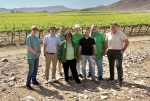MINISTER of Agriculture, Water and Land Reform, Calle Schlettwein has dismissed an approach by the Agronomic Producers Association proposing the utilization of existing Green Scheme Irrigation Projects in the north to produce wheat in the 2022 production season.
In a statement this week, Schlettwein said that during the preliminary discussions with the Agronomic Producers Association, it became clear that the association aimed for at least a three season/year leasehold for several green schemes.
“A leasehold of that nature is not possible without a proper bidding process according to the national lease procedures and, therefore, the Ministry advised the Association to rather participate in responding to our Requests For Proposals (RFPs) for leaseholds of green-schemes for terms long enough to get returns on the respective investments, which will be published in batches as from the end of May a 2022.
“The Ministry also wishes to state to the public that the proposal by the Agronomic Producers Association was considered as an indication from the private sector of a market opportunity for all private operators instead of members of the Association only. As such, if the proposal were to be entertained, it would have been opened up to all interested parties through a short term Expression of Interest (Eol) which would have given all potentially interested private operators opportunity to bid,” he said.
The Ministry of Agriculture, Water and Land Reform (MAWLR) had received a proposal from the Association to assist with utilizing green schemes that are currently lying idle for the production of winter crops, particularly wheat. It was understood that the proposal would bridge the current winter crop season and assist us to get a wheat harvest this year and, therefore, we proceeded with that understanding to discuss and determine possible conditions aimed at local participation, amongst others.
“Our main aim was to mitigate a possible shortage of wheat later this year and next year. The information from The Food and Agriculture Organization (FAO) is that due to the war in Ukraine, there is a food price crisis developing in the short term, which could escalate to non-availability of wheat and wheat products later.
“In the meantime the MAWLR in cooperation with the green scheme managers will proceed to facilitate the planting of wheat where possible. We call on our stakeholders in the farming community to support with technical and other advice. We have the possibility to mitigate a looming crisis with our own means. We want to thank the Agronomic Producers Association for their proposal and all those that have assisted with technical advice,” further said Schlettwein.
Recently, it was reported that three agricultural projects in northern Namibia – Etunda, Shadikongoro and Ndonga Linena irrigation projects – are at a standstill since the last harvest season in October 2021, due to financial constraints faced by the Agricultural Business Development Agency (Agribusdev).
The agency received N$4 million from the agriculture ministry in April last year, for winter crop production but received nothing for summer production. Agribusdev, the agency that manages 11 green schemes, has reportedly been underfunded for the last five years, leading to the projects screeching to a halt.
In their proposal, APA proposes a 50/50 profit share system is proposed, where existing machinery and implements and labour force at the Green Scheme Projects are used or a 70/30 profit share system is proposed where producers provide all machinery, implements and labour.
“On project kick-off at the producers elected Green Scheme farm a joint, detailed stock taking is done. This initial stock taking report is then submitted to the MWALR for record. At project completion the closing stock taking report is again submitted which will reflect all initial recorded items as well as improvements and additions.
“Green Scheme farms which were utilised in these projects will then be in an improved operational state for the next planting seasons. If no successful tenders are awarded for the following six months, the above business plan could be extended for another six months summer crop production,” APA noted.
Wheat is a cereal grain crop mainly produced under irrigation, with a total domestic demand of about 123 305 tons in 2021. In 2021, producers produced 18 459 tons of wheat from a total of 2 842 hectares planted. The production of wheat occurs in five (5) production areas namely, Kavango, North Central, Karst, Central/East, and South, but the largest volume of wheat come from in Kavango and Hardap areas. During the same year, 2021, Namibia imported 104 847 tons of wheat, which means 85% of the domestic demand was imported.










